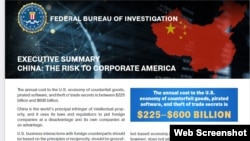Protection of intellectual property remains a sticking point between the U.S. and China as the world’s two largest economies compete to develop next-generation technologies.
On June 28, China’s state-run Xinhua news agency accused the U.S. of using the subject of intellectual property rights, more specifically, its part on protection of industrial property, as a way to hinder China’s economic growth.
In a commentary, authored by agency’s writer Shi Yang, Xinhua claimed:
“The IPR rhetoric is just one of the many disguises that the U.S. employs to conceal its real intention to crack down on emerging economies like China, whom it perceives as a potential threat to its economic hegemony.”
That is misleading.
U.S. legal action against China for economic espionage is a response to Beijing’s large-scale theft of intellectual property.
In fact, 80% of all economic espionage cases by the U.S. Justice Department pursued as of 2021 involved China’s illegal economic activities.
The FBI estimates that Chinese theft of trade secrets, counterfeit goods and pirated software costs the U.S. economy between $225 billion and $600 billion annually.
The FBI says China uses its vast market to attract foreign firms and then reverse engineer foreign technology, saving Chinese firms time and money on research and development.
“As in its military strategy, China’s economic strategy is ‘asymmetric,’ taking advantage of a U.S. system founded on openness and wealth creation. In contrast, China protects large firms at home, coerces technology transfer, then seeks to eliminate leading foreign competitors,” the American Enterprise Institute, or AEI, a Washington, D.C., think tank, concluded in its June 8 report “China’s Technology Strategy: Leverage Before Growth”.
Criticizing the U.S. response to Beijing’s “predation,” AEI’s leading China analysts Dan Blumenthal and Derek Scissors, who co-authored the report, stated: “The U.S. has done little to blunt Chinese predation, indirectly supporting it with money and technology. If the most innovative American companies lose intellectual property and market share without consequence, China will control more sectors of the global economy.”
Below are recent examples of how Chinese state actors use fraud and deception to steal valuable intellectual property from U.S. companies.
GE Aviation case (2022)
In November 2021, a U.S. federal jury convicted Xu Yanjun, a Chinese government intelligence officer, of conspiracy to commit economic espionage and attempted trade secret theft. He was sentenced to 20 years in prison in 2022.
Xu, a career Chinese Ministry of State Security intelligence officer, approached a GE Aviation employee in Cincinnati in March 2017. He then requested that employee to obtain “system specification, design process” data for GE Aviation’s exclusive composite aircraft engine fan module.
GE is the only company in the world that is able to produce this light fan module.
The FBI managed to flip the GE Aviation employee, which led to Xu’s subsequent arrest in Brussels, where he brought cash as a payoff for the trade secret.
Then assistant U.S. Attorney General John Demers said: "[T]his case is not an isolated incident. It is part of an overall economic policy of developing China at America’s expense.”
APT 41 (2022)
In 2022, Boston-based cybersecurity firm Cybereason uncovered a yearlong operation by APT 41, a Chinese state-sponsored espionage group. The operation successfully siphoned hundreds of gigabytes of intellectual property and sensitive data from 30 multinational companies.
According to Cybereason, the APT 41 operation, which had been going on undetected since at least 2019, was aimed at “stealing sensitive proprietary information from technology and manufacturing companies mainly in East Asia, Western Europe, and North America.”
Cybereason CEO Lior Div noted that the cybercriminals were focused on obtaining blueprints “for cutting-edge technologies, the majority of which were not yet patented.”
These included blueprint diagrams for fighter jets, helicopters, and missiles, intellectual property related to drugs treating diabetes, obesity and depression, and designs for solar panel and edge vacuum system technology.
Huawei case (2020)
In 2020, the U.S. Justice Department charged Chinese telecommunications firm Huawei with stealing trade secrets from six U.S. companies over two decades.
According to the indictment, Huawei grew its telecoms empire “by using fraud and deception to misappropriate sophisticated technology from U.S. counterparts.”
The indictment said Huawei would enter into confidentiality agreements with U.S. firms that owned the intellectual property, and then violate the terms by misappropriating the intellectual property. It also used proxies, such as professors working at research institutions, to obtain and provide the technology needed for its own use.
Using such methods, Huawei has successfully obtained nonpublic intellectual property relating to router source code, cellular antenna technology and robotics.
Huawei then sold these products in the U.S. as lower cost versions of U.S. products, giving the Chinese telecoms giant a significant and unfair competitive advantage.







